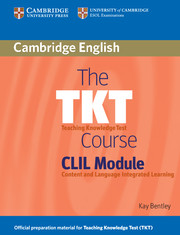Unit 16 - Types of assessment
Published online by Cambridge University Press: 27 September 2023
Summary
What different types of assessment are there in CLIL?
There are two main types of assessment. Summative assessment is assessment of learning. Its purpose is to review learning of subject content and to help us know what learners have achieved at a specific time. This is often at the end of a unit of work or at the end of a course. Formative assessment is assessment for learning. It is on-going, continuous assessment and helps us to understand how much and how well our learners are learning about subject content. It gives us information about our learners so we can give them useful feedback on their progress. Formative assessment also provides feedback which can lead us to change or adapt our future teaching, our materials and the tasks we create.
Key concepts
What different types of assessment do you use?
Assessment for learning in CLIL contexts can involve learners in many different types of assessment. The choice of assessment depends on the reason for testing our learners. We need to know what we are looking for when assessing and which standards we will use to evaluate and make decisions. In many CLIL contexts, teachers use a range of assessment types.
Summative
Summative assessment is done when we want to find out what our learners already know about subject content and how well they can use the language of our subject. Summative assessment is often quite formal. Standardised tests are examples of summative assessment. They are written by external examiners and usually lead to a subject qualification. Another example of summative assessment is a diagnostic test which we can use to identify problems learners have with subject content.
Formative
Formative assessment is usually done by the teacher in the classroom as part of the teaching and learning process. It is done to find evidence of learning and development in individual learners or among groups of learners. Formative assessment is often informal. We can do informal assessment daily by effective questioning of what has already been learned, by observing and recording learners during lessons and by collecting data such as samples of written or recorded work. Formative assessment can also be carried out during collaborative group work or oral presentations. This is sometimes called performance assessment.
- Type
- Chapter
- Information
- The TKT Course CLIL Module , pp. 89 - 94Publisher: Cambridge University PressPrint publication year: 2010



